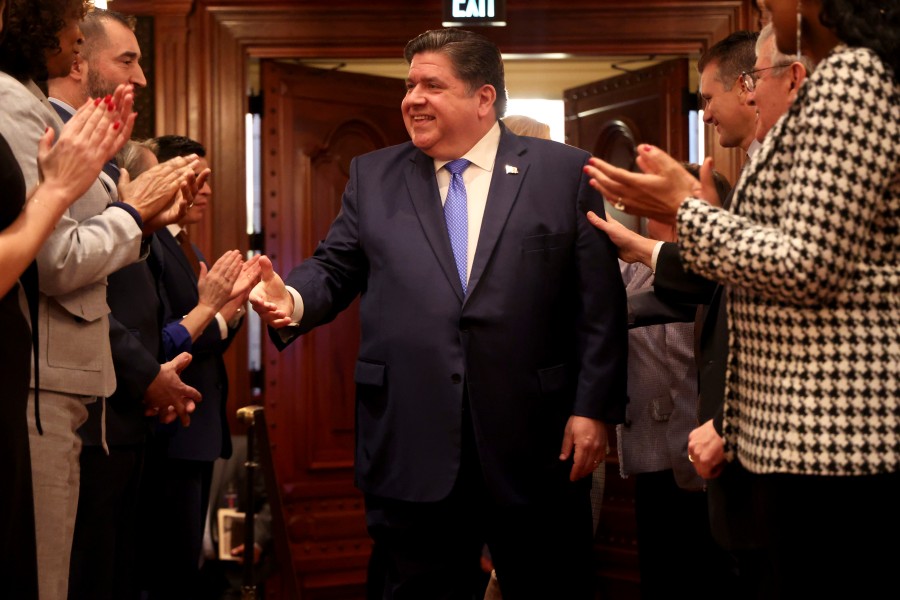Gov. JB Pritzker wants to increase a state tax credit, but Republicans say it’s not enough
Pritzker aims to tie the tax break back to inflation, but GOP critics decry his move as a “tax increase.”
By Dave McKinney

Gov. JB Pritzker wants to increase a state tax credit, but Republicans say it’s not enough
Pritzker aims to tie the tax break back to inflation, but GOP critics decry his move as a “tax increase.”
By Dave McKinneyAn inflation-indexed tax credit that millions of Illinoisans receive would rise for the 2024 tax year under a $93 million proposal by Gov. JB Pritzker, but the increase is short of what current law dictates and what legislative Republicans and former Democratic Gov. Pat Quinn want.
The possible increase in the standard exemption from $2,425 to $2,550 per person was included within Pritzker’s proposed $52.7 billion budget proposal he outlined Wednesday.
But it drew only scant attention in the actual budget and was not touched upon by the governor during his nearly hour-long speech defining his budgetary priorities to lawmakers.
Pritzker’s proposed change would amount to slightly less than $25 in savings for a family of four over 2023 tax year levels, according to calculations by WBEZ.
WBEZ first reported about state lawmakers last year quietly putting a pause on an automatic, inflation-indexed increase in the standard exemption. The move saved $114 million that Pritzker’s administration and legislative Democrats redirected elsewhere.
Since 2011, under a tax law change championed by former Democratic Gov. Pat Quinn, the standard exemption increased with inflation, from a $2,000 deduction in 2011 to $2,425 in 2022.
Had the deduction been allowed to stay in step with actual inflation, the 2023 standard deduction amount would have been $2,625. That total would have reflected the 8% increase in the consumer price index during 2022, the highest inflationary jump since 1981.
When Pritzker and Democrats instead decided last year to keep the $2,425 amount in effect for the 2023 tax year, the law was written so the inflation escalator would resume for the 2024 tax year and continue in place through the 2028 tax year.
That meant the standard exemption would automatically rise to $2,775 for tax year 2024.
That’s $225 more than what Pritzker is now proposing — setting up a scenario where lawmakers doing nothing on the governor’s proposal this spring actually would be more generous for taxpayers than what Pritzker is floating.
A rise in the standard deduction from $2,425 to $2,775 would result in tax savings for a family of four of more than $69, according to WBEZ calculations.
“Gov. Pritzker’s FY25 budget proposal advances the fiscal discipline he has advocated for since day one while continuing to invest in working families,” Pritzker spokesman Alex Gough said. “In line with those goals, the budget proposal restores automatic increases to the standard exemption while ensuring the increase aligns with a balanced budget.”
A spokesman for Senate President Don Harmon, D-Oak Park, characterized Pritzker’s plan as a “starting point.” State Rep. Jehon Gordon-Booth, D-Peoria, who is the lead budget negotiator for House Democrats, similarly called Pritzker’s proposal “the first step in a longer process.”
But the governor’s plan was attacked Thursday by the No. 1 Senate Republican and described as a revenue source for Pritzker’s proposed $182 million plan to confront the state’s migrant crisis.
“This is going to hit low-income [and] middle-income families, and it is a tax increase,” Senate Minority Leader John Curran, R-Downers Grove, said in an interview with WBEZ. “If the Legislature does not go along with this, people will get a greater tax savings with the current existing law than what the governor has proposed.
“This is just bad policy,” Curran continued, “and it’s just a governor desperate to try to fund his noncitizen welfare programs.”
Quinn told WBEZ on Thursday that Pritzker’s plan for the standard exemption is not enough.
“This is tax relief for families raising children and for all taxpayers in Illinois, but it should be raised by the proper amount,” Quinn said.
“The exemption should always be indexed every year in a proper way,” he continued. “That’s what politicians do with their own pay. They index their pay every year and the same way with the gas tax. I do think that this tax-relief measure should be properly done to give maximum tax relief to everyday people who live from paycheck to paycheck.”
More than 11 million Illinoisans claim the standard exemption on their taxes each year, and it’s available to individuals with $250,000 in adjusted gross income or less or couples with $500,000 in adjusted gross income or less.
Pritzker’s office said the governor’s proposed budget last year included funding to pay for the automatic inflationary increase in the standard exemption for the 2023 tax year, but lawmakers opted to freeze the credit at the 2022 level.
“In FY25, the governor is proposing moving forward with a one-year increase at a minimum within a balanced budget framework,” Gough said. “As always the final budget will be negotiated by the governor and his partners in the General Assembly and as the governor has said, his top priority is signing a balanced budget that invests in working families.”
As for GOP criticism to the plan, Gough said, “If Republicans have additional ideas for reductions in spending or revenue ideas, we welcome them and look forward to hearing those details.”
Dave McKinney covers Illinois government and politics for WBEZ and is the former long-time Springfield bureau chief for the Chicago Sun-Times.
